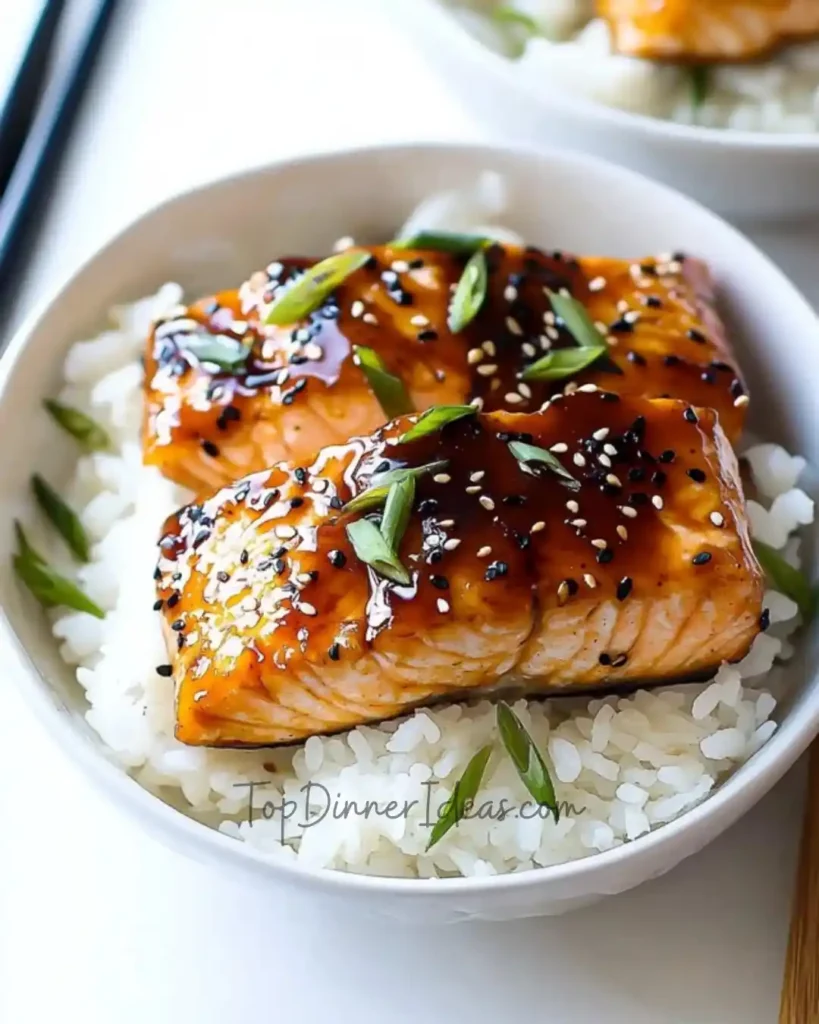Our Teriyaki Salmon shines as the best teriyaki glazed salmon recipe due to its balanced flavors and adaptability in cooking methods. Whether you prefer baked salmon teriyaki, air fry teriyaki salmon, or traditional honey teriyaki salmon, this dish seamlessly fits into your preferred cooking style. The succulent salmon paired with the tangy and sweet glaze offers a delightful experience that appeals to both flavor enthusiasts and health-conscious diners.
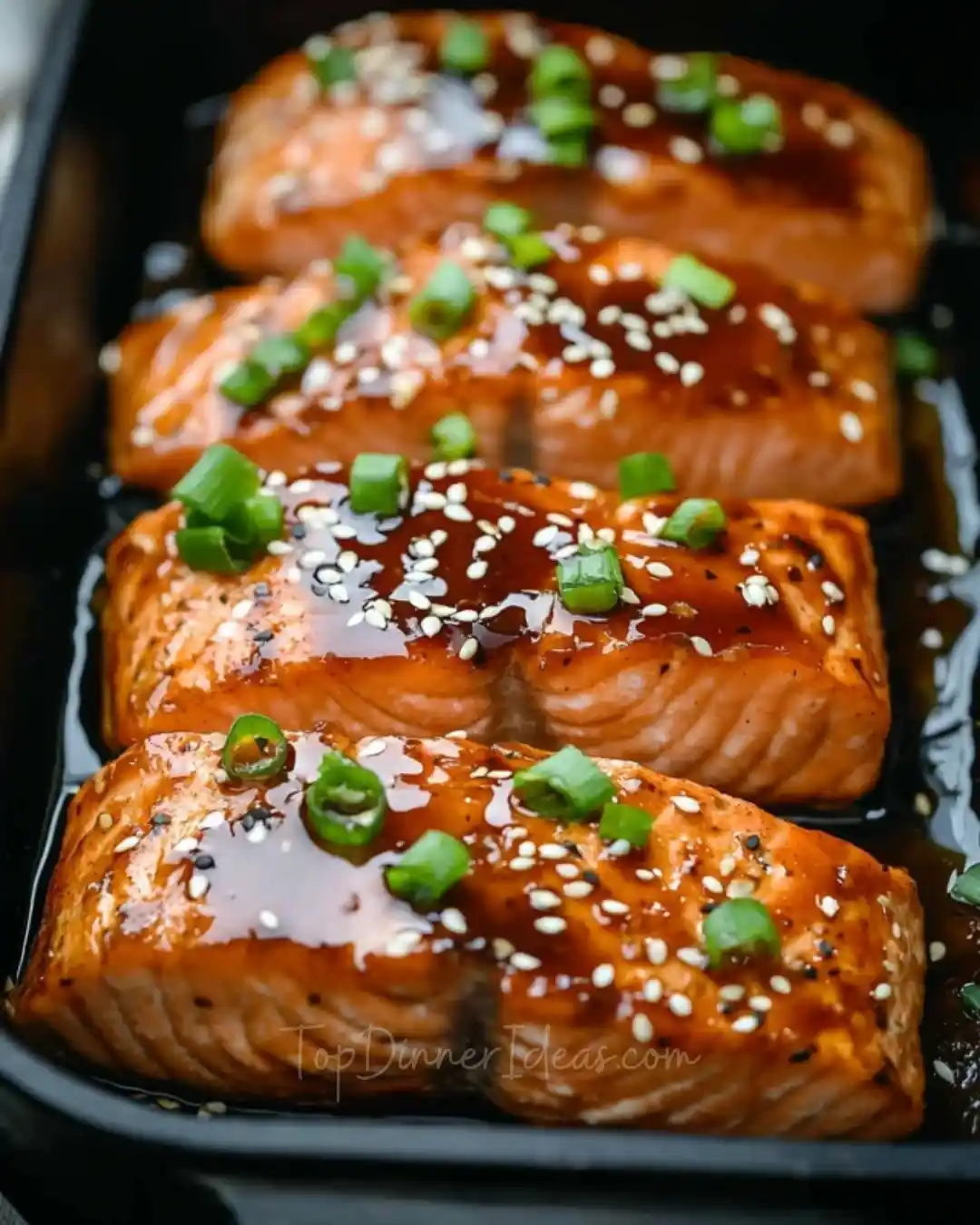
I fondly remember the first time I served teriyaki salmon at a family gathering. The combination of the rich salmon and the flavorful teriyaki sauce was a hit, earning praise from everyone at the table. Inspired by that success, I refined this recipe to ensure it’s both delicious and straightforward, making it perfect for any occasion.
Equipments for Teriyaki Salmon
Having the essential tools ready can simplify the preparation of Teriyaki Salmon. Below are the necessary items for this recipe:
- Oven or Air Fryer: Depending on your chosen cooking method, ensure you have a reliable oven or air fryer.
- Baking Sheet or Air Fryer Basket: For baking or air frying the salmon.
- Small Saucepan: To prepare the teriyaki sauce.
- Whisk: For blending the sauce ingredients smoothly.
- Measuring Cups and Spoons: For accurate ingredient measurements.
- Spatula or Tongs: To handle the salmon safely.
- Cutting Board and Knife: For prepping garlic and other ingredients.
- Optional: Aluminum Foil or Parchment Paper: To line the baking sheet for easier cleanup.
With these tools at your disposal, preparing Teriyaki Salmon becomes a seamless and enjoyable process, ensuring a delicious meal without any hassle.
Ingredients for Teriyaki Salmon
Feel free to adjust the ingredients based on your preferences and what you have available in your kitchen. Here’s what you’ll need for our Teriyaki Salmon:
For the Salmon:
4 salmon steaks (6 oz each), skin removed
Salt and pepper, to taste
2 tablespoons olive oil or butter, for searing
For the Teriyaki Sauce:
1/3 cup soy sauce or tamari for a gluten-free option
1/4 cup honey
3 cloves garlic, minced
1 tablespoon fresh ginger, grated
2 tablespoons rice vinegar
1 tablespoon sesame oil
1 teaspoon cornstarch mixed with 1 tablespoon water (optional, for thickening)
1 tablespoon sesame seeds (for garnish)
2 green onions, sliced (for garnish)
For Serving:
Steamed vegetables (e.g., broccoli, snap peas, or carrots)
Rice or quinoa
Lemon wedges
These ingredients come together to create a flavorful and balanced meal that highlights the succulent salmon with a sweet and savory teriyaki glaze.
Instructions to Teriyaki Salmon
Preparing a delicious Teriyaki Salmon is straightforward and allows you to enjoy a flavorful meal with minimal effort. Follow these steps to craft a sweet and savory dish:
Preheat Your Cooking Appliance:
If baking, preheat your oven to 400°F (200°C).
If using an air fryer, preheat it to 375°F (190°C).
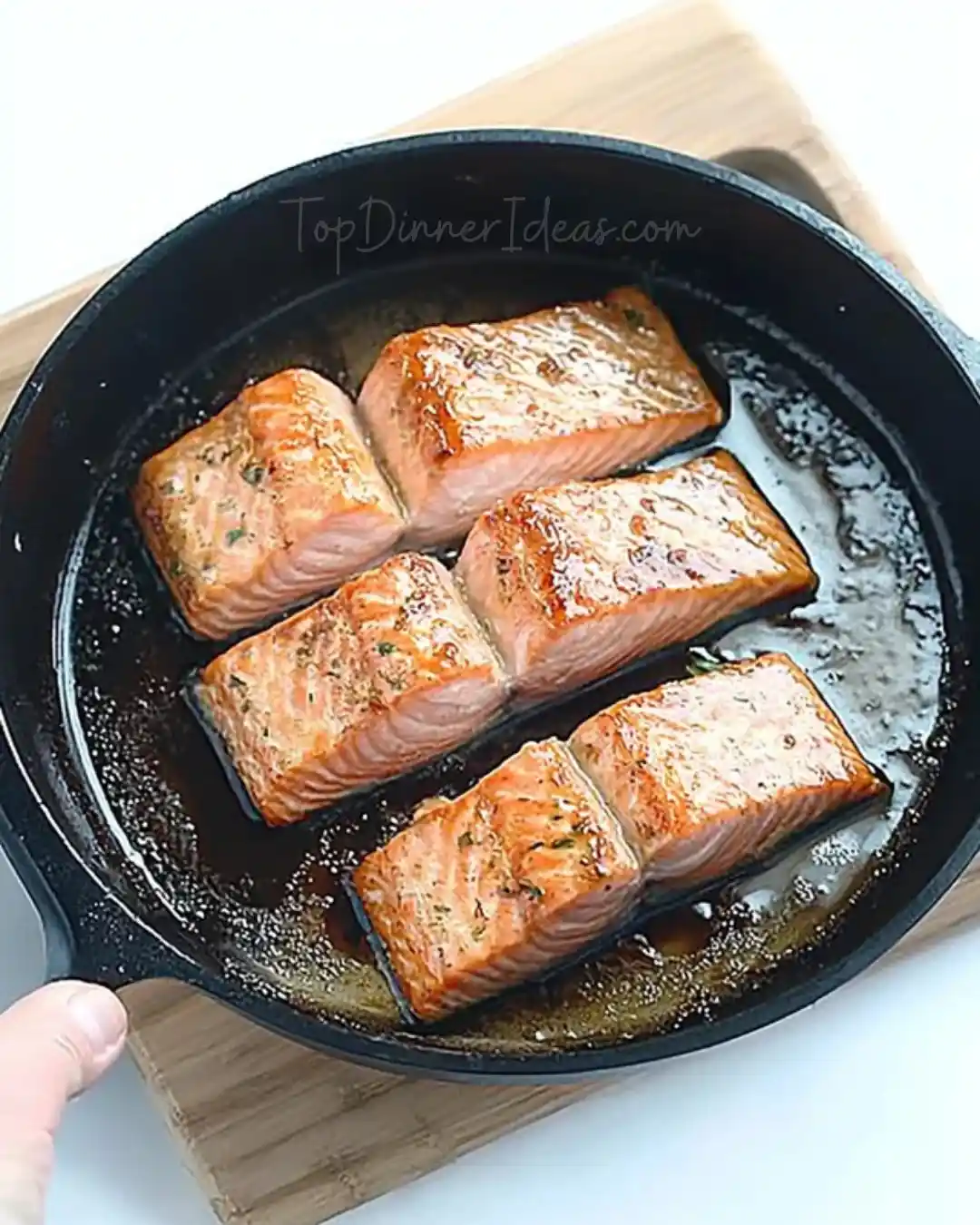
Season the Salmon:
Pat the salmon steaks dry with paper towels.
Season both sides generously with salt and pepper.
Sear the Salmon (Optional for Extra Flavor):
In a large skillet, heat olive oil or butter over medium-high heat.
Once hot, add the salmon steaks and sear for 2-3 minutes on each side until they develop a golden crust. This step adds depth to the flavor but can be skipped for a quicker preparation.
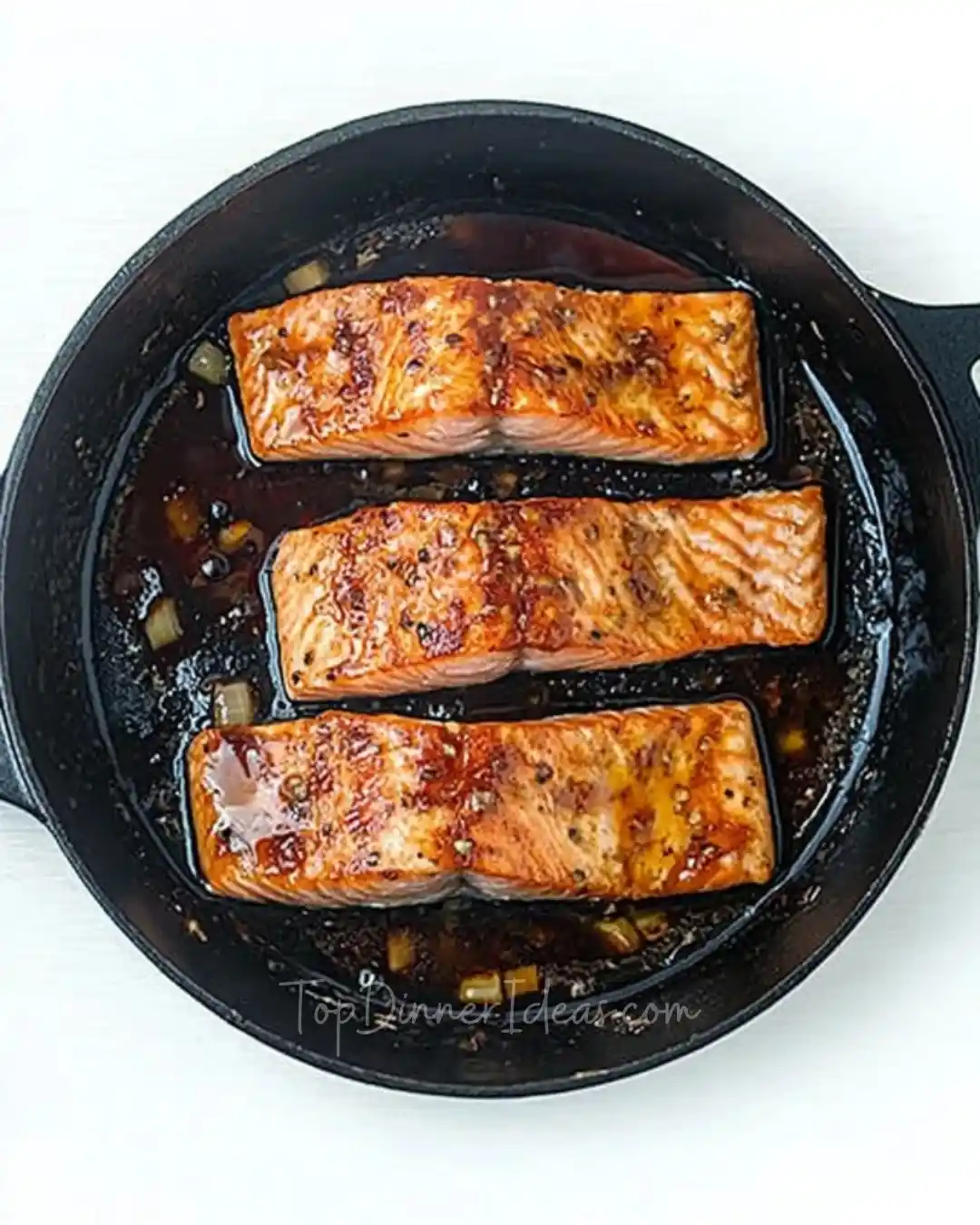
Prepare the Teriyaki Sauce:
In a small saucepan, combine soy sauce, honey, minced garlic, grated ginger, rice vinegar, and sesame oil.
Bring the mixture to a simmer over medium heat, stirring continuously.
If you prefer a thicker sauce, mix in the cornstarch slurry and cook for an additional 1-2 minutes until the sauce thickens.
Remove from heat and set aside.
Bake or Air Fry the Salmon:
Baking Method:Place the seared or unseared salmon steaks on a lined baking sheet.
Brush each steak generously with the teriyaki sauce.
Bake in the preheated oven for 10-12 minutes, or until the salmon flakes easily with a fork.
Air Fryer Method:Place the salmon steaks in the air fryer basket in a single layer.
Brush each steak with the teriyaki sauce.
Cook for 8-10 minutes, or until the salmon is cooked through and flakes easily.
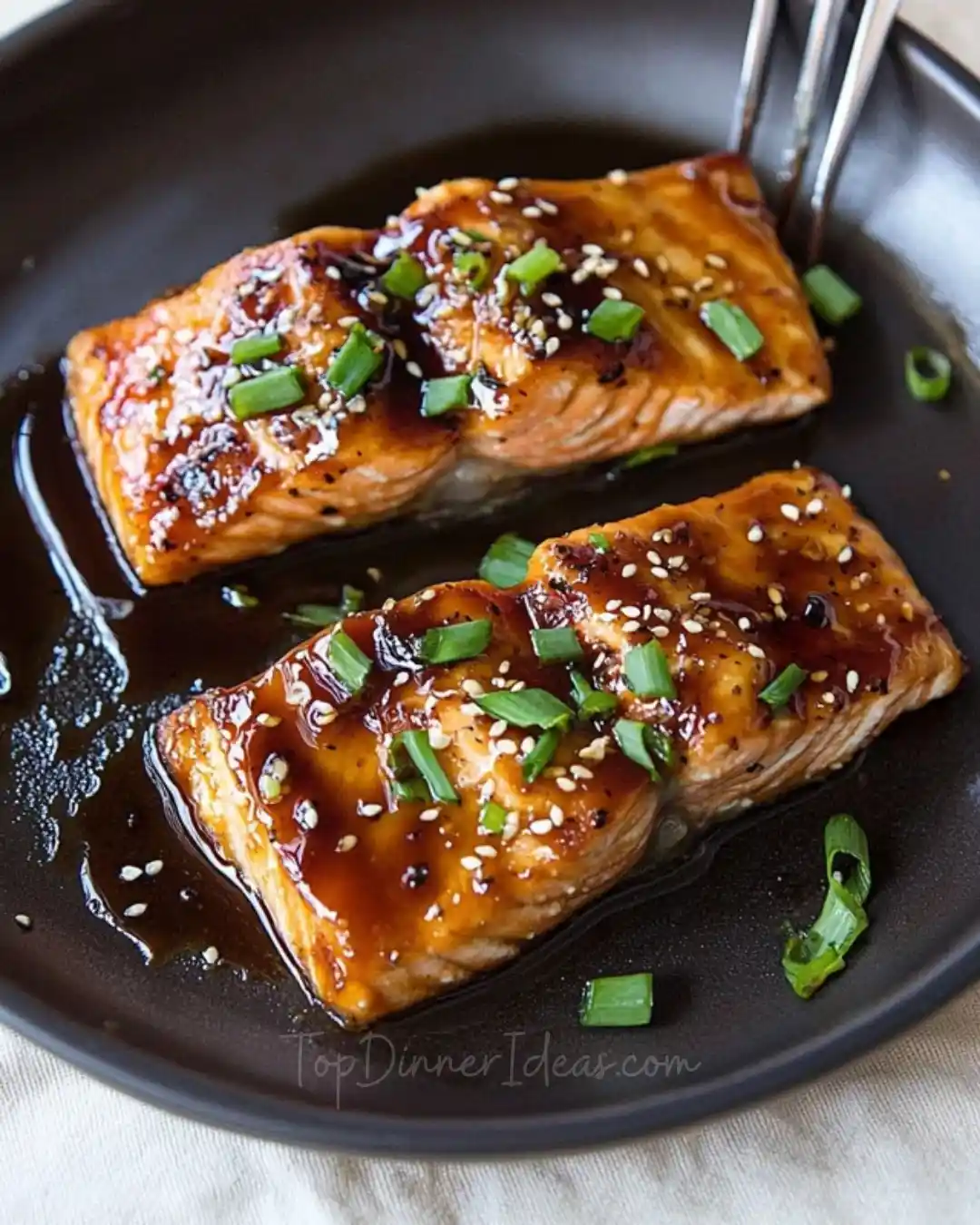
Garnish and Serve:
Transfer the cooked salmon to serving plates.
Drizzle any remaining teriyaki sauce over the top.
Garnish with sesame seeds and sliced green onions.
Serve with steamed vegetables, rice, or quinoa, and add lemon wedges on the side for an extra burst of citrus flavor.
Enjoy your homemade Teriyaki Salmon with a side of steamed vegetables, rice, or quinoa for a wholesome and satisfying meal.
Allergen Information for Teriyaki Salmon
When preparing Teriyaki Salmon, it’s important to be mindful of potential allergens to ensure everyone can enjoy the meal safely. Here’s what you need to know:
- Contains: Soy (soy sauce), Fish (salmon), and Sesame (sesame oil and seeds).
- Possible Cross-Contamination: Ensure that all utensils and surfaces are thoroughly cleaned if you have severe allergies, especially if preparing other dishes that contain common allergens like soy or fish.
Understanding these allergen details helps you make informed choices and adjustments, ensuring a safe and enjoyable dining experience for everyone.
Substitutions for Teriyaki Salmon
Adapting the Teriyaki Salmon recipe to suit different dietary needs is easy and ensures everyone can enjoy this delicious dish. Here are some versatile substitution options:
- Gluten-Free Option: Use tamari or coconut aminos instead of soy sauce to make the sauce gluten-free.
- Dairy-Free Option: Replace butter with additional olive oil or a dairy-free butter alternative when searing the salmon.
- Vegan Option: Substitute salmon with firm tofu or tempeh, and use agave nectar instead of honey. Ensure to use a plant-based marinade.
- Lower Sodium Option: Choose a low-sodium soy sauce or reduce the amount used in the sauce to lower the sodium content.
- Ingredient Replacements:
- Salmon Steaks: Use other fatty fish like mackerel, trout, or halibut for a different flavor profile.
- Honey: Replace with maple syrup or brown sugar for a different type of sweetness.
- Garlic: Use shallots or leeks for a milder flavor alternative.
- Fresh Ginger: Substitute with ground ginger if fresh is unavailable.
- Sesame Oil: Use peanut oil or vegetable oil as a substitute, though it will alter the flavor slightly.
These substitutions make it simple to tailor the dish to various dietary preferences without compromising on taste.
Knowing these substitution options allows you to customize the recipe according to individual dietary needs, ensuring everyone can partake in the deliciousness of Teriyaki Salmon.
Variations of Teriyaki Salmon
Once you’ve mastered the basic Teriyaki Salmon recipe, there are numerous ways to personalize and enhance it. Here are some creative ideas to inspire your culinary adventures:
- Honey Teriyaki Salmon: Add an extra tablespoon of honey to the sauce for a sweeter glaze.
- Spicy Teriyaki Salmon: Incorporate sriracha or red pepper flakes into the sauce for a spicy kick.
- Garlic Teriyaki Salmon: Increase the amount of minced garlic or add roasted garlic for a deeper garlic flavor.
- Teriyaki Salmon with Pineapple: Add pineapple chunks or pineapple juice to the sauce for a tropical twist.
- Herbed Teriyaki Salmon: Mix in fresh herbs like thyme, rosemary, or cilantro into the sauce for added aroma.
- Citrus Teriyaki Salmon: Incorporate orange or lime juice alongside lemon for a citrusy variation.
- Teriyaki Salmon with Vegetables: Add sliced bell peppers, onions, or snap peas to the baking sheet for a complete one-pan meal.
- Teriyaki Salmon Skewers: Cut the salmon into cubes and thread onto skewers with vegetables for a grilled version.
- Teriyaki Glazed Salmon Burgers: Use the teriyaki glaze as a topping for salmon burgers for added flavor.
- Teriyaki Salmon Pasta: Toss flaked teriyaki salmon with pasta and vegetables for a hearty dish.
These variations encourage creativity and allow you to adapt the recipe to suit your taste preferences and special occasions.
Knowing these variations helps you keep the Teriyaki Salmon exciting and versatile, allowing you to explore different flavor profiles and presentation styles.
Notes on Teriyaki Salmon
Enhance and customize your Teriyaki Salmon with these helpful tips:
- Use Fresh Ingredients: Opt for high-quality, fresh salmon and freshly grated ginger for the best flavor and texture.
- Marinate for More Flavor: Allow the salmon to marinate in the teriyaki sauce for at least 15-30 minutes before cooking to deepen the flavors.
- Adjust Sweetness: Modify the amount of honey based on your sweetness preference; add more for a sweeter glaze or reduce for a more savory profile.
- Even Coating: Ensure the teriyaki sauce coats the salmon evenly for consistent flavor in every bite.
- Monitor Cooking Time: Keep an eye on the salmon while baking or air frying to prevent overcooking, which can make the fish dry.
- Use a Meat Thermometer: Check that the salmon reaches an internal temperature of 145°F (63°C) for perfectly cooked fish.
- Let It Rest: Allow the salmon to rest for a few minutes after cooking to let the juices redistribute, ensuring moist and tender fillets.
- Enhance with Nuts: Sprinkle toasted sesame seeds or chopped nuts over the salmon for added texture and flavor contrast.
- Serve with Fresh Herbs: Garnish with additional fresh herbs like cilantro or parsley for a burst of color and freshness.
- Pair with Complementary Sides: Choose sides that complement the sweet and savory flavors, such as roasted vegetables, couscous, or a fresh salad.
- Store Properly: If preparing in advance, store the sauce separately to prevent the salmon from becoming soggy.
- Experiment with Cooking Methods: Try grilling or broiling the salmon for a different texture and flavor profile.
These tips help you achieve the best results and make the cooking process smoother and more enjoyable.
Knowing these additional tips allows you to refine your cooking technique and customize the dish to better suit your preferences and needs.
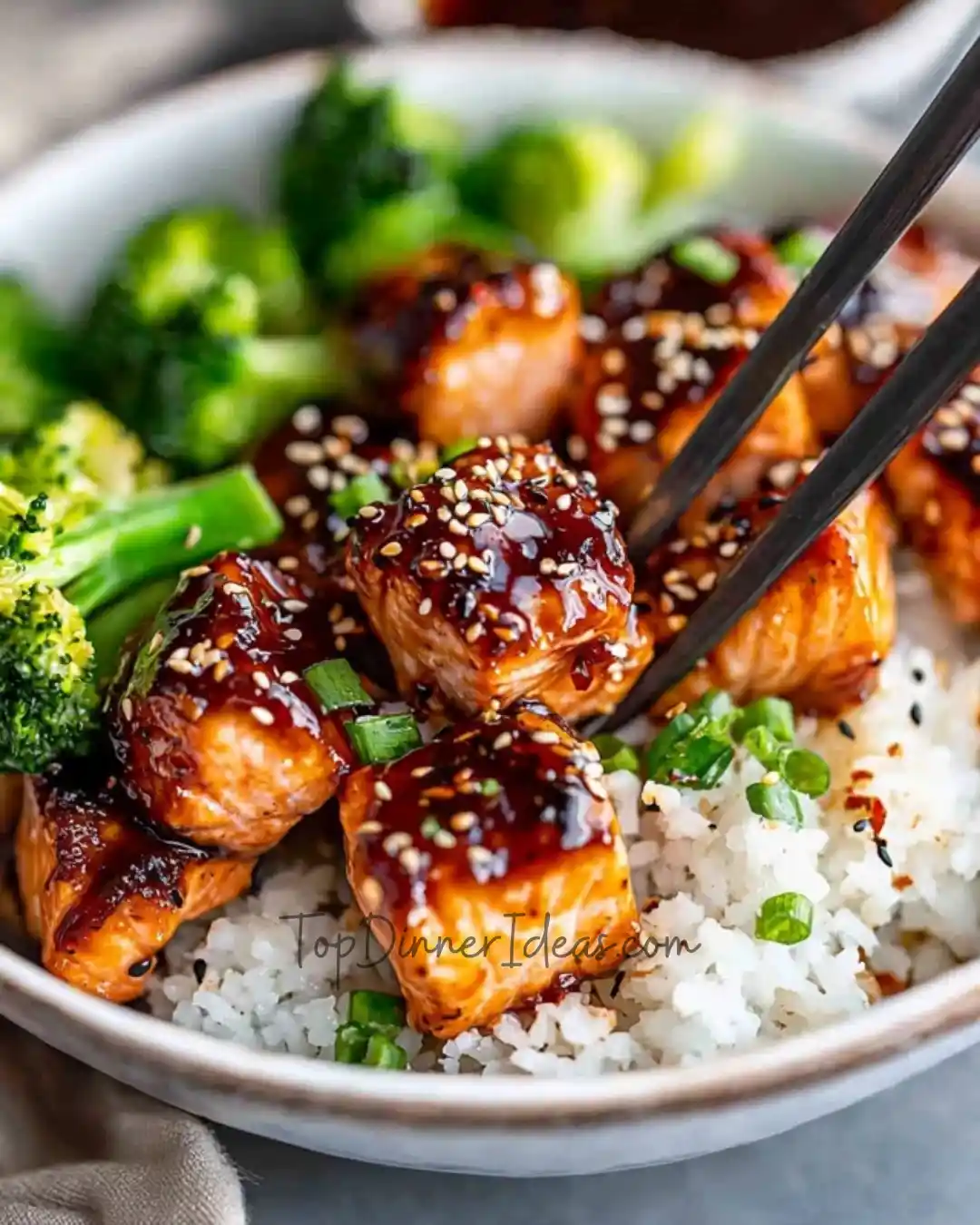
Health Benefits of Teriyaki Salmon
Indulging in our Teriyaki Salmon is not only a treat for your taste buds but also offers several health benefits. Here’s how the key ingredients contribute to your well-being:
Salmon:
- Omega-3 Fatty Acids: Supports heart health, reduces inflammation, and promotes brain function.
- High-Quality Protein: Essential for muscle growth and repair.
- Vitamins and Minerals: Rich in B vitamins, vitamin D, selenium, and potassium.
Soy Sauce:
- Protein: Adds additional protein to the meal.
- Vitamins and Minerals: Contains iron and manganese, which are important for energy production and metabolism.
Honey:
- Natural Sweetener: Provides a healthier alternative to refined sugars.
- Antioxidants: Contains compounds that help protect the body from oxidative stress.
- Antibacterial Properties: Supports immune health.
Garlic:
- Immune Boosting: Enhances the immune system’s ability to fight off infections.
- Anti-Inflammatory: Helps reduce inflammation in the body.
- Heart Health: Aids in lowering blood pressure and cholesterol levels.
Ginger:
- Digestive Health: Helps in relieving digestive issues.
- Anti-Inflammatory: Contains gingerol, which has anti-inflammatory properties.
- Antioxidants: Protects cells from damage caused by free radicals.
Olive Oil:
- Healthy Monounsaturated Fats: Promotes heart health by reducing bad cholesterol levels.
- Antioxidants: Provides anti-inflammatory benefits.
Fresh Herbs (Green Onions):
- Vitamins and Minerals: High in vitamins A, C, and K, as well as essential minerals like iron and potassium.
- Antioxidants: Help combat free radicals and reduce the risk of chronic diseases.
Enjoying this dish as part of a balanced diet can contribute to overall health and well-being. Remember to savor it in moderation to maintain a healthy lifestyle.
Knowing the health benefits of the ingredients allows you to make informed choices about your diet and appreciate the nutritional value of your meals.
Nutrition Facts
Understanding the nutritional content of our Teriyaki Salmon can help you make informed dietary choices. Here’s a breakdown per serving:
- Calories: 450 kcal
- Protein: 35g
- Fat: 25g
- Saturated Fat: 6g
- Carbohydrates: 20g
- Sugar: 12g
- Fiber: 1g
- Sodium: 800mg
This nutritional profile makes the Teriyaki Salmon a balanced meal option, providing a substantial amount of protein to support muscle growth and repair while offering healthy fats from olive oil. The carbohydrates from honey and soy sauce add a touch of sweetness, making it a flavorful and satisfying dish. It’s important to enjoy this meal in moderation, especially considering the sodium content from soy sauce.
Knowing the nutritional information helps you incorporate this dish into your dietary plan, ensuring it aligns with your nutritional goals.
Nutritional values can vary based on specific ingredient brands and measurements used. For more precise information, refer to the labels of your chosen ingredients.
Cooking Tips for Teriyaki Salmon
Mastering the art of cooking Teriyaki Salmon is easier with a few expert tips:
- Use Fresh Ingredients: Opt for high-quality, fresh salmon and freshly grated ginger for the best flavor and texture.
- Marinate for More Flavor: Allow the salmon to marinate in the teriyaki sauce for at least 15-30 minutes before cooking to deepen the flavors.
- Adjust Sweetness: Modify the amount of honey based on your sweetness preference; add more for a sweeter glaze or reduce for a more savory profile.
- Even Coating: Ensure the teriyaki sauce coats the salmon evenly for consistent flavor in every bite.Monitor Cooking Time: Keep an eye on the salmon while baking or air frying to prevent overcooking, which can make the fish dry.
- Use a Meat Thermometer: Check that the salmon reaches an internal temperature of 145°F (63°C) for perfectly cooked fish.
- Let It Rest: Allow the salmon to rest for a few minutes after cooking to let the juices redistribute, ensuring moist and tender fillets.
- Enhance with Nuts: Sprinkle toasted sesame seeds or chopped nuts over the salmon for added texture and flavor contrast.
- Serve with Fresh Herbs: Garnish with additional fresh herbs like cilantro or parsley for a burst of color and freshness.
- Pair with Complementary Sides: Choose sides that complement the sweet and savory flavors, such as roasted vegetables, couscous, or a fresh salad.
- Store Properly: If preparing in advance, store the sauce separately to prevent the salmon from becoming soggy.
- Experiment with Cooking Methods: Try grilling or broiling the salmon for a different texture and flavor profile.
These techniques will help you achieve perfectly cooked, flavorful Teriyaki Salmon every time.
Knowing these cooking tips ensures you can consistently produce delicious and well-prepared meals, enhancing your overall cooking experience.
Storage Advice for Teriyaki Salmon
Properly storing Teriyaki Salmon ensures it stays fresh and delicious for future meals. Here’s how to do it:
- Refrigeration: Store any leftover salmon in an airtight container in the refrigerator for up to 3 days. Keep the sauce separate if possible to prevent the salmon from becoming too moist.
- Freezing: For longer storage, place the salmon and sauce in freezer-safe containers or resealable bags. Freeze for up to 2 months. Thaw overnight in the refrigerator before reheating.
- Reheating: Gently reheat the salmon in the oven at 275°F (135°C) for about 10-15 minutes, or until warmed through. Alternatively, microwave on medium power in short intervals, checking frequently to avoid overcooking.
- Preventing Sogginess: If storing with rice or vegetables, keep them separate and combine just before serving to maintain their textures.
- Labeling: Clearly label containers with the date to keep track of freshness and ensure timely consumption.
- Leftover Reuse: Transform leftovers into salmon salads, sandwiches, or incorporate them into pasta dishes for added flavor and protein.
By following these storage guidelines, you can enjoy your Teriyaki Salmon safely and conveniently at a later time.
Knowing how to properly store your dishes helps minimize food waste and ensures you always have a delicious meal ready when needed.
Serving Suggestions for Teriyaki Salmon
Presenting Teriyaki Salmon in creative ways can elevate your dining experience. Here are some ideas to inspire your presentations:
- Over Rice or Quinoa: Serve the salmon atop a bed of fluffy rice or quinoa to soak up the flavorful sauce.
- With Steamed Vegetables: Pair with steamed broccoli, snap peas, or carrots for a balanced meal.
- On a Bed of Salad: Place the salmon over a fresh green salad with a light vinaigrette for a refreshing option.
- With Roasted Potatoes: Accompany with crispy roasted potatoes for a hearty side.
- Garnished with Fresh Herbs: Sprinkle chopped fresh parsley, cilantro, or dill over the top for added color and freshness.
- With Lemon Wedges: Add lemon wedges on the side for an extra burst of citrus flavor.
- In Pita Wraps: Flake the salmon and serve in pita bread with tzatziki sauce and veggies for a Mediterranean twist.
- With Garlic Bread: Serve alongside slices of garlic bread to complement the garlic in the sauce.
- In a Bento Box: Include the salmon with a variety of sides like edamame, sushi rice, and pickled vegetables for a complete meal.
- With a Drizzle of Balsamic Glaze: Add a drizzle of balsamic reduction for a sweet and tangy contrast.
These serving ideas not only enhance the presentation but also provide a balanced and satisfying meal.
Knowing these serving suggestions allows you to diversify your meals and present your dishes in an appealing and appetizing manner.
Troubleshooting Teriyaki Salmon
Encountering issues while preparing Teriyaki Salmon? Here are common problems and their solutions to ensure your dish turns out perfectly:
- Salmon Overcooked and Dry: Use a meat thermometer to check for an internal temperature of 145°F (63°C). Remove the salmon from the oven or air fryer as soon as it reaches this temperature to prevent overcooking.
- Sauce Too Sweet: Balance the sweetness by adding more lemon juice or a splash of soy sauce. Incorporate a pinch of salt to enhance the savory flavors.
- Sauce Too Salty: Reduce the amount of soy sauce or use a low-sodium variety. Add a bit more honey or lemon juice to balance the saltiness.
- Lack of Flavor: Ensure the garlic and ginger are fresh and thoroughly minced to release their full flavor. Taste and adjust the seasoning with additional honey, soy sauce, or spices as needed.
- Sauce Not Thickening: Let the sauce simmer for a few extra minutes to reduce and thicken. Alternatively, mix in the cornstarch slurry and cook until the sauce reaches the desired consistency.
- Salmon Sticks to the Pan: Ensure the baking sheet or air fryer basket is well-oiled or lined with parchment paper. Avoid overcrowding the pan, which can cause sticking.
- Uneven Cooking: Make sure the salmon steaks are of uniform thickness. Flatten thicker parts slightly to ensure even cooking throughout.
- Sauce Separation: Stir the sauce continuously while heating to maintain a smooth consistency. Avoid high heat, which can cause the sauce to separate.
- Garlic Burnt and Bitter: Sauté the garlic gently and avoid cooking it at too high a temperature to prevent burning. Alternatively, add garlic later in the cooking process.
- Salmon Lacks Moisture: Marinate the salmon in the teriyaki sauce before cooking to help retain moisture. Ensure not to overcook the salmon, as it can dry out.
These solutions will help you overcome common hurdles and achieve delicious Teriyaki Salmon every time.
Knowing how to troubleshoot common issues ensures you can consistently produce high-quality dishes, enhancing your cooking confidence and skills.
FAQ About Teriyaki Salmon
Yes, you can prepare the sauce and marinate the salmon a few hours in advance. Store the marinated salmon in the refrigerator and cook just before serving. This not only saves time but also allows the flavors to deepen.
Complement your salmon with sides like steamed vegetables, rice, quinoa, roasted potatoes, or a fresh green salad. Adding a side of garlic bread or quinoa pilaf can enhance the meal’s heartiness.
Bake the salmon in a preheated oven at 400°F (200°C) for about 12-15 minutes, or until it flakes easily with a fork. Cooking times may vary based on the thickness of the salmon steaks.
Serve with sides such as garlic mashed potatoes, sautéed spinach, roasted Brussels sprouts, or a quinoa salad. Freshly steamed broccoli or green beans also make excellent accompaniments.
The teriyaki sauce made with soy sauce, honey, garlic, ginger, rice vinegar, and sesame oil is ideal. For added depth, you can incorporate ingredients like mirin or a splash of sake.
Teriyaki Salmon is inspired by traditional Japanese teriyaki cooking methods, where fish is glazed with a sweet and savory sauce. While there’s no single inventor, it has become a popular dish in modern kitchens for its delightful flavor combination.
Baking at 350°F (175°C) typically takes about 20-25 minutes. However, cooking times can vary based on the oven and the thickness of the salmon steaks, so using a meat thermometer is recommended for precision.
Yes, you can freeze the marinated salmon. Place the salmon and sauce in a freezer-safe container or bag and freeze for up to 2 months. Thaw overnight in the refrigerator before baking or air frying.
No, it’s not recommended. While plain salmon is safe for dogs in moderation, the honey, soy sauce, garlic, and ginger used in the recipe can be harmful to them. Always avoid feeding your pets seasoned or prepared human foods.
Teriyaki Salmon can last in the refrigerator for up to 3 days when stored in an airtight container. For the best quality, consume within this timeframe and reheat gently before serving.
Yes, you can substitute honey with other sweeteners like maple syrup, agave nectar, or brown sugar. Adjust the quantity to match your desired level of sweetness.
These answers address common concerns and help you make the most of your Teriyaki Salmon experience.
Knowing the answers to these FAQs ensures you have the information needed to successfully prepare and enjoy this delicious dish.
Footnotes for Teriyaki Salmon
Embarking on the journey to create Teriyaki Salmon opens up a world of culinary possibilities. Feel free to experiment with different ingredients and techniques to make this recipe your own. Whether you’re adding a spicy kick with sriracha or incorporating fresh herbs for an aromatic touch, your personal flair will make the dish uniquely yours. Happy cooking, and enjoy the flavorful adventure of your homemade teriyaki salmon!
For more delicious recipes and cooking tips, Navigate to our Main Dishes section, or visit Trustedrecipe. Thank you for choosing this recipe, and may your kitchen adventures be tasty and enjoyable!
